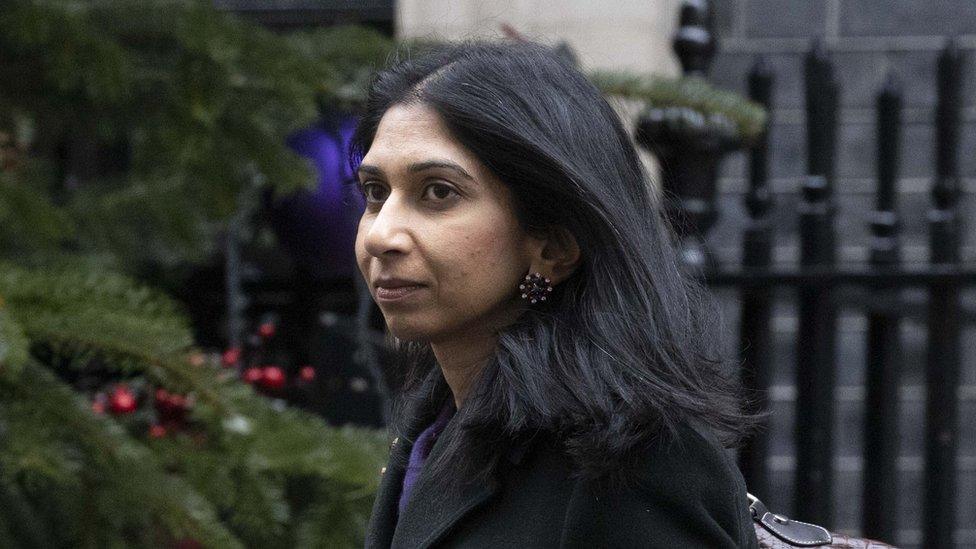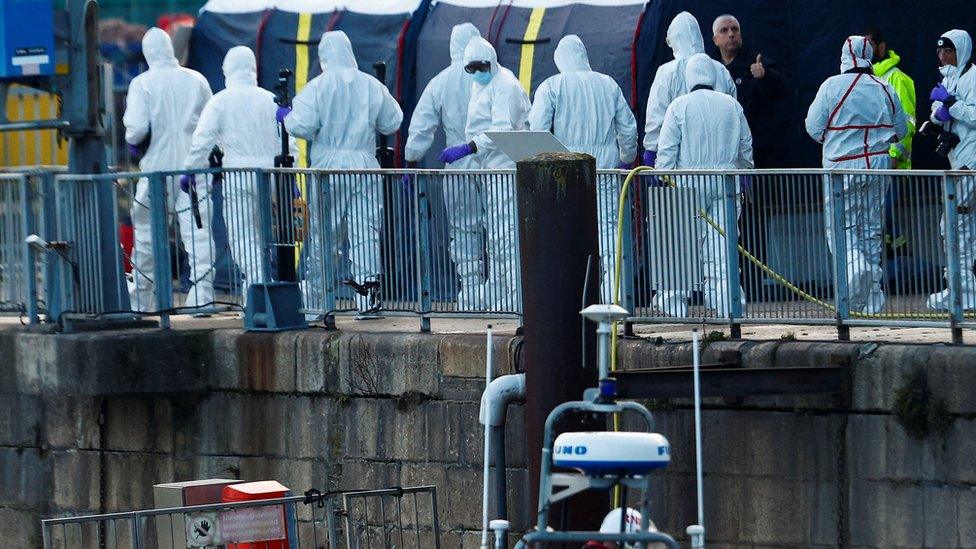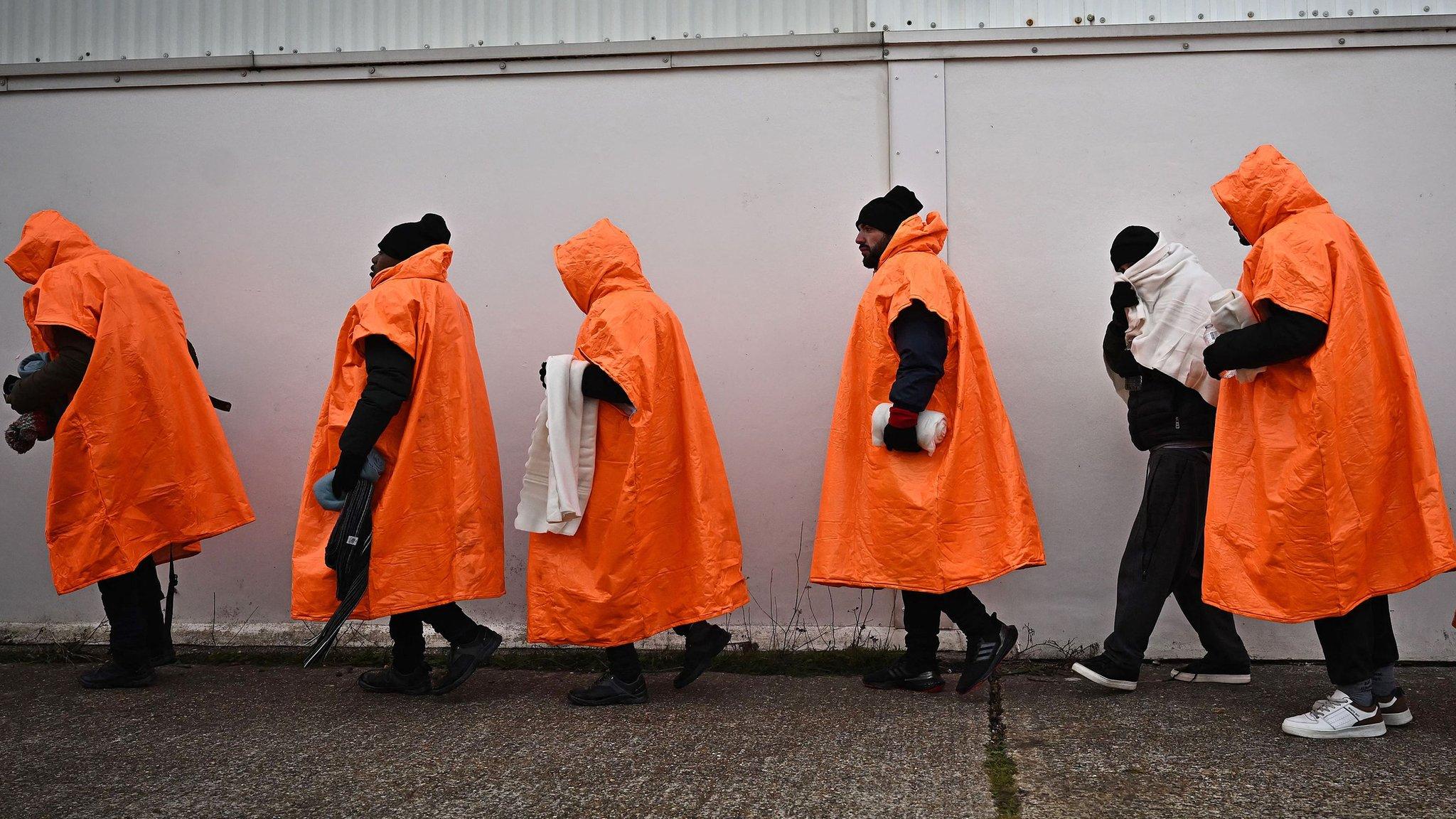Channel migrant asylum ban will save lives, says Braverman
- Published

Plans to ban migrants from claiming asylum in the UK will save lives, the home secretary has insisted.
Suella Braverman said a new law preventing illegal entrants from applying would deter people from crossing the Channel in small boats.
She added that the deaths of four people on Wednesday were a "sobering reminder" of "why we have to end these crossings".
Labour has branded the proposed legislation an "unworkable gimmick".
The UN's refugee agency says the law, expected in the coming months, would breach the UK's obligations under international law.
Ministers have come under increasing pressure to reduce Channel crossings, with more than 40,000 people making the journey this year.
The UK government has confirmed that four people have now died after a boat got into difficulties in the early hours on Wednesday.
Speaking in the Commons, Ms Braverman said a search and rescue operation was ongoing following the "terrible tragedy".
The incident, she told MPs, was "the most sobering reminder possible of why we have to end these crossings".
She said that crossing the Channel in unseaworthy vessels was a "lethally dangerous endeavour" - adding this was why ministers were "working so hard" to break the business model of the smugglers that facilitate the journeys.
She added that the government's new legislation, under which those entering the UK illegally would be prevented from remaining, would "act as a deterrent, and it will save lives".
Responding for Labour, shadow home secretary Yvette Cooper said action against smuggling gangs had been "too weak" - with criminal groups "proliferating around the Channel".

A search and rescue operation continues after the incident involving a dinghy on Wednesday
The government is yet to publish details of the law, with Prime Minster Rishi Sunak promising on Tuesday it would be introduced "early in the new year".
Outlining the plans to MPs on Tuesday, he said it would ensure those entering the UK illegally would be "detained and swiftly returned" to a safe country to make an asylum application, or returned to their home country.
Those taken out of the country would also be denied the right to re-entry, settlement or citizenship, he added.
The UNHCR, the UN's refugee agency, said on Tuesday that the plans will reduce access to the asylum system "for all but a few".
The agency's assistant high commissioner for protection, Gillian Triggs, added it would deny refugees a means to "establish their status," putting them "at risk of forced return to unsafe countries".
"It would also undermine the global refugee system at large and would be a violation of international refugee law," she added.
On Wednesday, a spokesperson for Mr Sunak insisted the plans would be compliant with the UK's international obligations.
Rwanda challenge
Knowingly entering the UK without a visa or special permission has been illegal since the passage of the Nationality and Borders Act in June.
However, the UK has an international legal obligation not to criminally penalise anyone who seeks protection as a refugee.
A freedom of information request to the BBC also showed that by mid-November, fewer than 100 people had been arrested on suspicion of breaking the new law.
A separate government plan to send some asylum seekers to Rwanda to claim asylum there has been blocked pending a legal challenge.
Ministers and campaigners against the policy are awaiting rulings from High Court judges, which are expected to be handed down on Monday.
Some Conservative MPs have argued the legal challenges to the Rwanda policy show the need for the UK to exit the European Convention on Human Rights.
On Wednesday, 69 of the party's backbenchers - including former home secretary Priti Patel - voted for a backbench bill that rulings by the European Court of Human Rights (ECHR) should be ignored when returning asylum seekers to safe countries.
Jonathan Gullis's bid to take his measure forward was defeated by 188 votes to 69.
Meanwhile, Justice Secretary Dominic Raab said a much-delayed Bill of Rights would help prevent further tragedies in the Channel by deterring people from making the dangerous journey.
The legislation would give ministers the power to ignore human rights rulings from the ECHR.
The bill was first introduced by Mr Raab in June, during his first stint as justice secretary, but was then shelved by Liz Truss under her short-lived premiership.
Mr Raab told Parliament's Joint Human Rights Committee the prime minister was "committed" to the bill and it was "ready to go", although he had not been given a date for MPs to start debating it.
- Published13 December 2023

- Published13 December 2022